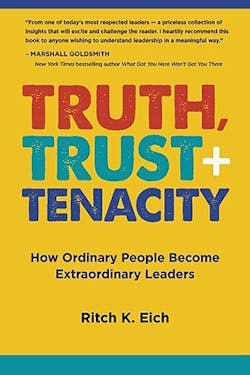After a lifetime of working with all kinds of leaders in the armed forces, health care and agriculture, I’ve learned a lot about what good - and not so good - leaders look like. In fact, I’ve written three books on the topic, including my most recent, Truth, Trust + Tenacity: How Ordinary People Become Extraordinary Leaders.
One of the common themes through all of my experiences, and in all of my books, is that the most successful organizations, what I call “winning organizations,” do not marginalize employees.
By marginalize, I mean the treatment of hardworking employees who aren’t being encouraged to advance, aren’t being mentored or counseled to better position themselves within the organization, are taken for granted because they are dependable and productive, or are being overlooked because others are receiving preferential treatment.
What happens when someone feels marginalized?
When an employee feels he (or she) is a commodity, and not a particularly valuable one, not only does that employee suffer, so do many others — along with the company.
Not long ago, Gallup published a report that indicated 70% of employees were not engaged at work. I recently read the 2016 “Steelcase Global Report: Engagement and the Global Workplace.” The report highlighted the impact that employee engagement can have on the bottom line: If employees don’t feel like they are taken seriously by an organization, critical talent is squandered and productivity suffers—leading to missed deadlines, wasted resources and lost profits. The result is mediocrity — or worse.
It doesn’t take a rocket scientist to realize that employee engagement and workplace satisfaction results in higher productivity, lower turnover and a better P&L statement. Productive and happy employees are the same ones who have more control over their work experiences. Marginalized employees become disconnected. In other words, if you don’t take employees for granted, they won’t take the organization for granted.
Winning organizations take many steps to ensure their employees do not feel marginalized—they offer incentives to grow and excel instead of feeling abandoned. Dave Brandon, CEO of giant toy retailer Toys “R” Us, told me: "I love to put in people who are waiting for their chance. You should never underestimate the power of people who have something to prove."
Former Indy 500 race car driver and current CEO of Chelsea Milling Co., manufacturer of “JIFFY” Mix, Howdy Holmes shared the following with me during a personal tour of his factory: “We encourage our people to continuously better themselves, to read widely and pursue self-improvement. We want them to constantly recalibrate their ‘filing system.’” During the three hours I spent with him, I couldn’t help but notice he called each of the many employees we encountered by their first names and knew a lot about each one. He sees each worker as an individual with different needs, aspirations and passions but treats each and every one as an asset and an integral part of the extended Holmes family.
Ensuring that all employees have access to opportunities is critical—not just for employees, but for the positive impact it can have on the organization.
Sometimes, employees who are quiet and focused are mistaken for being complacent or lacking initiative. While I believe that as individuals, we have some responsibility to champion ourselves, I also believe that organizations have a responsibility to ensure they don’t alienate hardworking and dedicated members of their teams.
Here are six recommended actions to make sure your employees don’t become marginalized:
- Provide professional development for employees at all levels. Give everyone the opportunity to learn new skills.
- Incorporate team feedback when evaluating employees. Managers aren’t always privy to an employee’s performance the way co-workers are.
- Give team leaders the flexibility to make changes when necessary. Sometimes good employees are in the right company, but the wrong job.
- Do not limit communication to email or text messaging. Ensure face-to-face interactions are frequent; you may be surprised by what you experience and learn. Nothing replaces the human connection.
- Performance appraisals for managers and supervisors should include specific behaviors they must exhibit to minimize marginalizing employees.
- Say “thank you.” These two words are especially important during difficult times and turnaround situations where fiscal recognition and awards are less common. While people may not work simply because they want to be praised, individuals who are not acknowledged will eventually leave, taking their skills and intellectual capital with them.
While perks like free coffee and bagels are nice, they are hardly enough. And just because Joe in accounting has his nose to the grindstone, that doesn’t mean he’s satisfied with the status quo. As humans, we want to make a meaningful contribution—and know that our efforts are genuinely appreciated. It’s not just the right decision; it’s the best business decision to ensure that your employees never feel marginalized.
As Stephen R. Covey reminds us: “Always treat your employees exactly as you want them to treat your best customers.”
Ritch K. Eich, Ph.D. (Michigan), retired naval reserve captain, health care executive and author, has published more than 100 articles and three books on leadership, donating the proceeds of each book’s sales to important charities.

